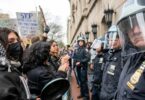Matthew Brazil
China’s popular, flag-waving Wolf Warrior movies employ parts of the Rambo formula for box office success: heroic soldiers in hand-to-hand combat with foreign and domestic enemies, car chases, shootouts, and, of course, explosions. Largely absent from that formula: any stultified and ignorant government officials and politicians who hinder our hero—because, after all, the Communist Party of China is always correct.
In 2019, a couple of years after Wolf Warrior 2 became yet another box office smash, China’s state-run media erupted in glee after one of its junior diplomats abroad took to Twitter to tell the US to go, well, jump in a lake with its criticism of Beijing’s horrid human rights record. Other Chinese diplomats follo-wed in a similar vein, sm-ack-talking the US and giving birth to the (domestically) popular “Wolf War-rior Diplomacy,” an increa-singly aggressive and som-etimes even outrageous be-havior by Beijing’s real-life envoys, not only at posts overseas but from the podium of the Chinese foreign ministry.
Sample: The Chinese ambassador to Sweden threatened his host country in a radio interview: “We treat our friends with fine wine, but for our enemies we have shotguns.” Ano-ther: China’s Consul Gene-ral in Kolkata, in a Twitter spat with a local person: “You speak in such a way that you look like part of the (Corona) virus and you will be eradicated just like the virus. Shame on you.”
And so on and so forth. There’s no perceivable end to such fare. According to the state-run, nationalistic Chinese tabloid Global Times, Beijing’s growing strength means that its population “is no longer satisfied with a flaccid diplomatic tone.”
Cue the ad for rhino horn and ginseng!
Peter Martin, a political reporter for Bloomberg News who has reported extensively from China and on its deteriorating relations with the US, does not stint on tales of such schoolboy-like behavior, now evidently embraced by the party leadership. But while serving up such ribald fare, Martin is after something bigger, and more important, than a compilation of such antics. Indeed, China’s Civilian Army: The Making of Wolf Warrior Diplomacy, an impressive debut by the Oxford, LSE and Peking University-educated Martin, is a valuable window into China’s rise as a global power.
Muscle Men
Seeming to arise with ever greater frequency, wolf warrior behavior is a sharp break from the more conventional diplomacy of the 1990s and 2000s, and is viewed with alarm by China’s neighbors and trading partners. It became violent one day in October 2020, when two PRC diplomats crashed the national day reception at Taipei’s mission in Fiji, first photographing guests and then beating a Taiwan diplomat who asked them to leave.
Martin has done copious research, citing numerous sources in Chinese, setting his book apart from the flood of amateurish works on China that seem to be published about once every 10 hours. Just as important, he has skillfully integrated lesser known aspects of Chinese Communist Party (CCP) diplomacy with more widely shared historical narratives about the Peoples Republic, each bringing additional clarity to the other.
For example, Martin describes how the CCP used American journalist Edgar Snow, author of the classic Red Star Over Chi-na—assigned widely in university coursework in the West for decades—to take to the world the stories of Mao Zedong and other CCP leaders in a carefully crafted, and censored, fo-rm. Snow’s 1935 trip to the party’s redoubt in Bao’an, coordinated by Zhou Enlai, arranged by CCP intelligence agents and apparently controlled by Mao, was a precursor to today’s “United Front” work to shape narratives about China in foreign countries.
Indeed, Martin’s account of the little-understood origins of PRC diplomacy is valuable in understanding official Chinese behavior today. When the People’s Republic was first established in 1949, Communist China’s first premier and foreign minister, Zhou (who had studied in Europe as a young man), described diplomats as “soldiers in civilian clothing.” Chinese successes at two major in-ternational conferences (at Geneva in 1954 and Band-ung the following year) led to expanded foreign recognition of the fledgling communist regime and validated Zhou’s leadership in diplomacy. Importantly, B-andung (a summit of newly independent Asian and Af-rican nations) allowed Ch-ina to promote its “five principles of peaceful coexistence,” a long-term triumph that paid off for de-cades by resonating throug-hout the non-aligned world with its prescription for avoiding entanglement in the US-Soviet Cold War. Such successes helped Bei-jing to multiply the number of its missions overseas in the decade that followed, particularly in Asia and Africa.
Plus ÇA Change
Like almost everything else about modern China, its arc of advancement was interrupted in 1966 by the Cultural Revolution, in which Mao enlisted masses of young people to overturn what he saw as entrenched and corrupt local party authority nationwide—not to mention neutralize his perceived rivals. Many Chinese diplomats were recalled to Beijing for ideological criticism and “reeducation,” a recurring act in the party. (Even in 1942-43, amid the Japanese occupation and virtual civil war with Chiang Kai-shek’s US-backed Nationalist government, for example, Mao and his spymaster K-ang Sheng ordered CCP envoys in Nationalist-held cities, including Zhou E-nlai, back to Mao’s wartime capital, Yan’an, for “rectification” and “salvation”) During the 1960s Cultural Revolution, some wolfish behavior erupted among some Chinese envoys who remained abroad, including a memorable incident in London on August 29, 1967 when junior diplomats em-erged from the Chinese le-gation in London with rods, baseball bats and an axe handle to attack journalists and police gathered outside. Ten days later, their behavior was la-uded in the official Peking Review, “Red Diplomats Armed with Mao Tse-tu-ng’s Thought Are Dauntless.” It was not mistaken for satire.
Certainly not by coincidence, Maoist Red Guards had assaulted and burned the British legation in Beijing less than a week earlier. Zhou’s Ministry of Foreign Affairs had slipped from his control and into chaos. In a narrow sense, the “Battle of Portland Place” in London and the praise it generated in China seem, in retrospect, to be a precursor of today’s wolf warrior diplomacy. Martin shows that Chinese diplomats today endorse at least some activities, backed by Xi Jinping, that are reminiscent of Mao’s time. As he recounts, in 2018:
Amidst Xi’s push for political control, diplomats had to sit through Yan’an-style “self-criticism” sessions in the foreign ministry and “inspection tours” which tested their loyalty to the party and willingness to follow orders…It was bec-oming increasingly clear that if you wanted to get ah-ead as a Chinese diplomat, you needed to be on board with Xi’s agenda or face irrelevance, perhaps worse.
Today, Chinese diplomats find themselves on the shortest possible leash. It’s not new that they must stick closely to repetitive talking points, always travel in pairs so that one may report on the other, and never act without instructions—though these measures are stricter than before. However, the required fealty to “Xi Jinping Thought” and the disregard for diplomatic standards are different. As Martin describes it, the trend seems to have been accelerated in July 2019 by a Chinese diplomat then based in Islamabad, Zhao Lijian. After exchanging insults over Twitter with former US national security advisor Susan Rice, Zhao was neither embarrassed nor disciplined but promoted to be one of the foreign ministry’s official spokespersons in Beijing. That move came on the heels of the rise of Hua Chunying from ministry spokesperson to head of its information department. For many in the building, Martin writes, Zhao (and Hua) “represented a fresh and new voice for a country that had for too long tiptoed around global opinion.” Late that year, just before COVID placed ever greater strains on China’s external relations, Xi Jinping called on Chinese diplomats to display more ‘fighting spirit” and get tough with the US Zhao Lijian had already suggested the Covid-19 pandemic originated in a US Army biological lab.
Untold Spies in the Woodwork
Martin gives us a detailed road map of how the US and its allies came to this place of increasingly strained relations with Beijing, but the related story of China’s espionage apparatus is largely missing, in spite of its unbreakable connections to diplomacy. The author’s account reveals very little about one of Zhou Enlai’s major roles during the Chinese revolution—that he was the father of CCP intelligence, about which Chinese language sources contain copious amounts of information that have become available also in English-language articles, podcasts, and books. We do not learn here that the party’s “Eighth Route Army Liaison Offices” in Nationalist-held cities during the Anti-Japanese War (1937-1945) were a model for China’s first foreign d-iplomatic posts, containing representatives from the CCP’s core functional departments: Organization, Propaganda, Military, and Intelligence. Martin briefly mentions CCP spymaster Li Kenong, but there are few details of his role in the Chinese revolution and after 1949 as one of Zhou Enlai’s vice-ministers of foreign affairs, when he also became the first director of PRC foreign intelligence. This part of the story is important because Chinese intelligence officers of the Central Investigation Department (or CID; Zhongyang Diaochabu, 1955-1983) were based in Chinese diplomatic posts overseas under diplomatic cover (which, to be fair, is the p-ractice of all governments worthy of the name). As well, in July 1979, Deng Xiaoping tried to withdraw Chinese intelligence officers from diplomatic posts overseas, considering embassies and consulates to be of poor utility as cover. The CID’s director of the time, Luo Qin-gchang, resisted Deng’s instructions until he was forced out in 1983. This s-tory, told in my 2019 book with Peter Mattis, Chin-ese Communist Espionage, also remains unacknowledged. But those are tiny quibbles. China’s Civilian Army is an invaluable, timely, and lively addition to serious contemporary literature on the regime and should be read by anyone seeking to understand how Beijing’s increasingly hostile tone with foreign countries arose—and how it might eventually reverse itself.






